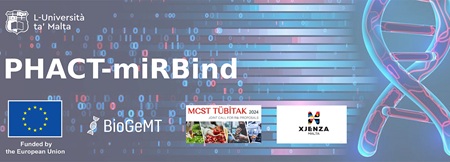
Register with Plumtri!
Register on plumtri as an Individual or as an Organisation to gain access to all of its useful features and remain updated on the latest R&I news, events and funding opportunities.
-
 Welcome to plumtriA platform for Research & Innovation
Welcome to plumtriA platform for Research & Innovation -
 Register today to start receiving our monthly newsletter
Register today to start receiving our monthly newsletter -
 Looking for Funding?Check out the current open calls
Looking for Funding?Check out the current open calls -
 Looking to partner up?Search our list of registered profiles
Looking to partner up?Search our list of registered profiles -
 You have questions on a particular funding programme?
You have questions on a particular funding programme?
Project: PHACT-miRBind

The BioGeMT team of the Centre for Molecular Medicine & Biobanking at the University of Malta has initiated a new international research collaboration with Sabanci University in Turkey to investigate microRNA target prediction using phylogenetic analysis.
The 24-month PHACT-miRBind project is funded by Xjenza Malta, in collaboration with the Scientific and Technological Research Council of Turkey, through the MCST/TUBITAK joint call for Research and Innovation proposals in Artificial Intelligence in Health.
The research will examine how evolutionary conservation analysis can enhance the accuracy of microRNA target identification. MicroRNAs are small regulatory molecules that control gene expression and are implicated in various diseases including cancer, neurodegenerative diseases, and cardiovascular conditions. Current computational methods for predicting microRNA targets face significant challenges in distinguishing functional interactions from non-functional sequence similarities.
The project will investigate the integration of phylogenetic conservation scores with machine learning approaches for target prediction.
The Centre's existing miRBind deep learning framework will be extended to incorporate evolutionary data from Sabanci University's PHACT (Phylogeny-Aware Computing of Tolerance) methodology, which analyses conservation patterns across species using phylogenetic trees and ancestral sequence reconstruction.
Prof. Panagiotis Alexiou leads the research team of the BioGeMT project at the Centre for Molecular Medicine & Biobanking, while Dr Ogun Adebali directs the efforts at Sabanci University. The collaboration will involve joint data analysis, algorithm development, and benchmarking.
The research outcomes will be made available to the scientific community through open-source software repositories and public datasets. The improved prediction tools are expected to advance understanding of microRNA regulatory networks and their roles in disease mechanisms.
The project is funded by the Malta Council for Science & Technology (MCST) and TUBITAK.
